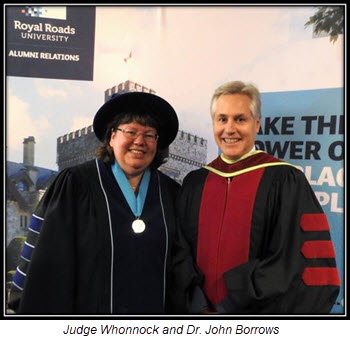How did the removal of cabooses from Canadian trains end up benefitting the Provincial Court of BC? And how did it lead to a judge becoming a doctor?
As a member of the Wet’suwet’en First Nation, Judge Karen Whonnock grew up on a farm near Smithers, BC. After finishing high school, Judge Whonnock went to work for the Canadian National Railway - at the age of 19 she was working as a brakeman and train conductor/yard foreman. When the company retired its cabooses and laid off staff, she decided to use the severance package they offered to attend university, becoming the first in her family to do so and beginning a life-long practice of setting and achieving goals.

After obtaining a Bachelor of Arts in Psychology in 1996, Judge Whonnock went on to obtain a law degree from the University of Toronto in 1999. She was admitted to the Law Society of BC in 2000.
Always passionate about education, Judge Whonnock worked for the BC government in post-secondary education in 2001 to support Aboriginal communities and their members in pursuing post-secondary training and education opportunities. She then served a four year term as an Associate Judge of the Colville Tribal Court in Washington State, where she presided over civil, family and criminal matters including criminal jury trials. Continuing her education at the same time, Judge Whonnock completed a Master of Laws in Alternative Dispute Resolution at York University’s Osgoode Hall Law School in 2003, focusing on indigenous dispute resolution systems and domestic violence. In addition, she taught courses at Northwest Indian College in Bellingham, Washington on the Lummi reserve, including courses on Indigenous Women and Leadership and Lummi Constitutional Law. Judge Whonnock also taught Gladue Report Writing at the Justice Institute of British Columbia.
Judge Whonnock also worked as a treaty negotiator, a lawyer for the BC Legal Services Society, and practised criminal law and family law in northern BC, receiving the Queen’s Counsel designation in 2014. In 2016 she was appointed a judge of the Provincial Court of BC.
However, in 2009 she had started the new Doctor of Social Sciences program at Royal Roads University. There she researched Aboriginal youth incarceration rates in Canada. The doctoral program involved two years of online course work and a month on campus in each of 2010 and 2011, followed by writing and defending a dissertation. Judge Whonnock demonstrated characteristic dedication and persistence in continuing with the program when the demands of work and family slowed her progress. In November 2018 she was awarded a Doctor of Social Sciences degree by Royal Roads University.

“I found it tremendously rewarding”, she says. “I enjoyed the time on campus even though living in student dorms and staying up late to complete assignments was hard. Program participants were intentionally selected with a variety of experience, so we learned from each other, and both students and faculty gave me great support. The program lived up to its motto – ‘living our learning’. Dr. John Borrows, my doctoral supervisor, was very supportive and inspirational. I am extremely grateful to him and my entire doctoral committee, Dr. Bernard Schissel and Dr. Mary Bernard, for their unfailing and thoughtful guidance.”
What lies next? Judge Whonnock mentions an interest in photography, and reading for pleasure (which she hasn’t had time for in the last decade), as well as unpacking boxes from her last move. Although we cannot call her Doctor Whonnock (as titles bestowed upon lawyers before they are appointed a Provincial Court judge, including Queen’s Counsel and degrees, are superseded by the appointment and not used until the judge retires), Judge Whonnock says she is both honoured and humbled to preside in court in the beautiful Williams Lake and surrounding Cariboo communities.
She adds, “As for education, I encourage everyone to pursue their educational dreams - whether it be a shorter program or a doctoral degree. You never know where your education will take you.”

